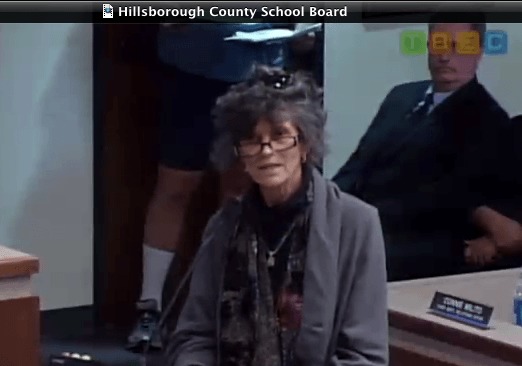
Karen Clay spoke passionately and eloquently about the definition of inclusion at February 5th’s Hillsborough County School Board meeting. Ms. Clay addressed comments made by board member Candy Olson that were published in an article by Marlene Sokol in the Tampa Bay Times.
You can watch the video here, go to Archived Meetings, February 5. Ms. Clay is on from 2:09-2:12. She was brilliant.

Here is the transcript:
My son graduated from Hillsborough County Schools in 1999 and when I brought him to the last school board meeting his comment to me was nothing has changed, not even some of the school board members.
I fought for him to remain in the classroom, I fought for him to attend his neighborhood school. I did not have to fight for him to be fully included, because Principal Vince Sussman at Plant High School knew that students with disabilities have value, have worth.
The district tried to put him on a special diploma track, he graduated with a 4.56 GPA.
He was fortunate to have teachers and principals that believe that he mattered, unlike the district personnel, who much like Ms. Olson, believe that inclusion has never been defined.
Inclusion is about the child’s right to participate and the school’s duty to accept the child. Inclusion rejects the use of special schools or classrooms to separate students with disabilities from students without disabilities. A premium is placed upon full participation of students with disabilities and upon respect for their social, civil and educational skills, rights.
Inclusion gives students with disabilities skills they use in and out of the classroom. Students with disabilities have rights to be in the least restrictive environment and to learn alongside their able bodied peers, much like society, the world today.
Ms. Olson your vision of the world is archaic. Your attitude toward children with special needs is outdated. An education for a child with special needs is not about a place, a building, a classroom – no, it’s the same as that for every other student. It’s about their neighborhood school where their brothers and sisters and friends are in attendance.
It amazes me that after all these years you have only attended a few IEP meetings and yet you talk about THESE students based solely upon the severity of their disability. I guess when you see my son laying on a flat wheelchair breathing with the assistance of a ventilator, you only see his disability. Well just this past weekend he spoke at one of the largest assistive technology conferences in this nation. He demonstrated how remotely controlling a robot can expand the presence of people with disabilities in the workforce, in schools and in society.
The severity of one’s disability does not determine their level of potential. The greatest barriers that persons with disabilities have to overcome are not steps or curbs it’s expectations. The low expectations for success at this school district clearly starts at the top – you simply do not care.”

At a workshop for Exceptional Student Education last Thursday, board member Candy Olson questioned inclusion. Her comments seem to have been made in another time period, before we had the Individuals with Disabilities Educational Act. In the article, Olson questions not only inclusion, but integration. Olson is not simply addressing the idea of separate classrooms within a school, but proposing separate schools for THESE students.
“While we lost several children and that is tragic, we have kept thousands of children safe day after day. But at what cost? At what cost to teachers and other staff, and at what cost to other children? We’ve talked about the number of kids and the severity… But we haven’t really talked about what that means to the school.
“While we have an obligation to care for the special needs kids, I think we have other obligations as well. I think we need an honest, open conversation about what appropriate means and what inclusion means in real world school level terms. Not only for the special ed teachers, but for the general teachers. We ought to talk about the cost of caring for and educating every one of our children. Not just in dollars, not just in checklists and documentation, but in terms of the impacts on the children and the adults in the school. We ought to talk about whether we should rethink how we serve our children in special needs, how we provide the best possible education to every child.”
“I don’t think we’ve given a lot of thought to the other kids”
You can read the entire article published in Tampabay.com’s Gradebook. here.







So we need to put special needs kids into special schools where other kids don’t have to be around them and then I suppose lock them away in an institution when they are out of school, so other adults don’t have to be around them. Hey, wait we use to do that and it worked so well… NOT
Thank You, but I basically spoke from the heart. Well, that and anger fueled by the comments of Ms. Olson. This school district must change & that change must start at the top!
YOU GO, GIRL! You are AMAZING!
Thank you Karen. Look forward to seeing the Film WRETCHES & JABBERERS in Tampa in April. Then hear from Larry and Tracy who were denied education in the long ago time. What human potential missed.
Are you ready for Saturday night:) we should see if she could come?
Can u pls email me this article?
just emailed you
Me too! Tres and I would love to meet them both!
She is absolutely amazing. I want to hear more from her and her son.
Thank you Karen Clay for stating so eloquently the heart cry of families with children who are differently abled.